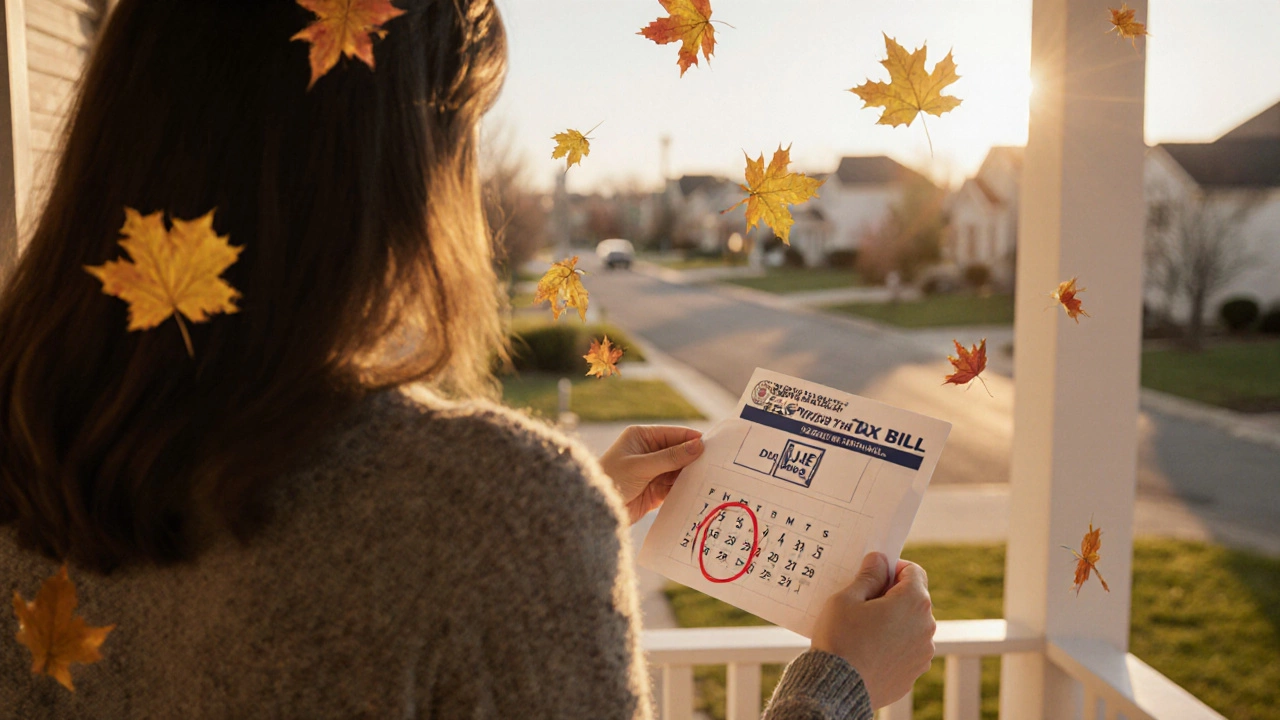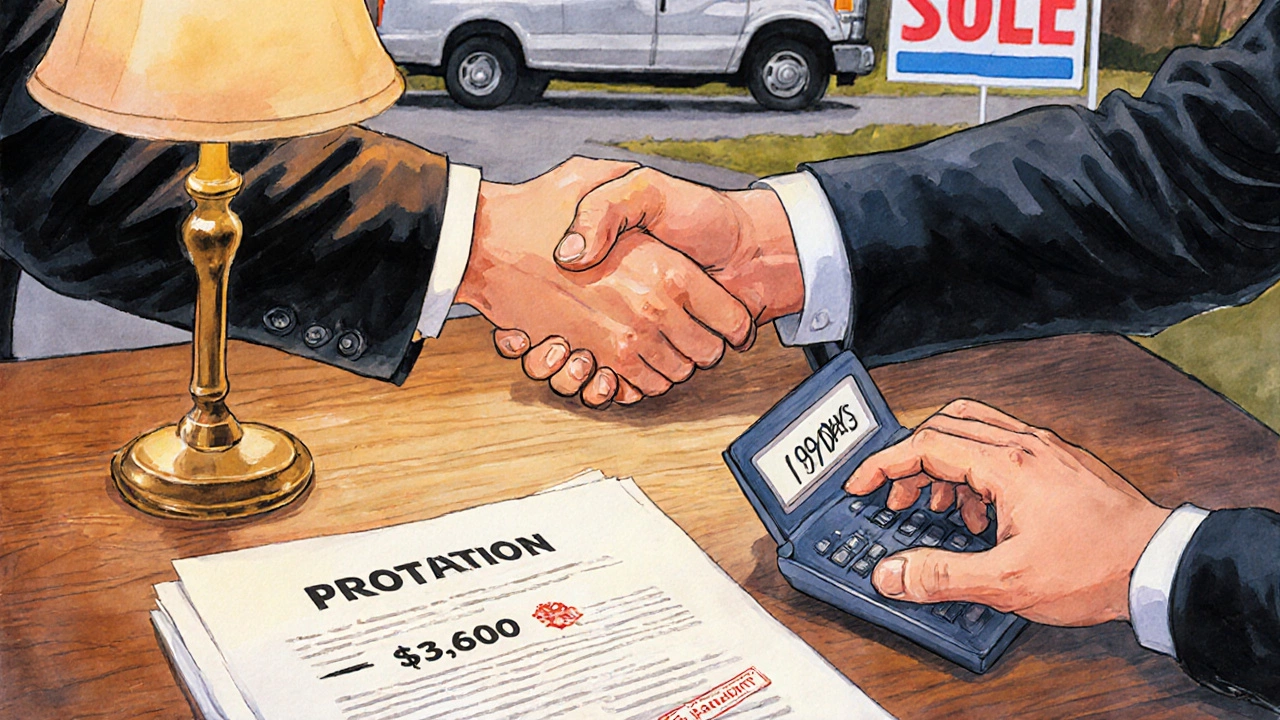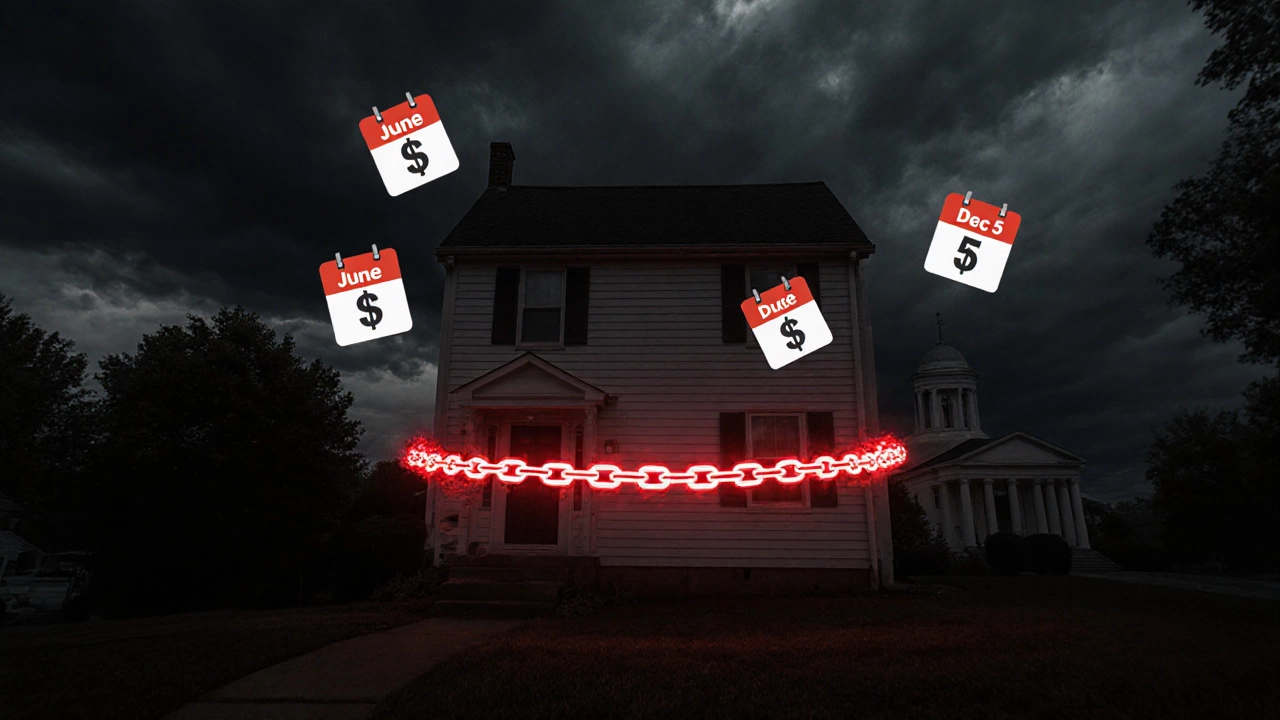Are Property Taxes Paid in Advance or Arrears in Virginia?

Nov, 18 2025
Virginia Property Tax Penalty Calculator
Calculate Your Virginia Tax Penalty
Virginia property taxes are paid in arrears with due dates on June 5 and December 5. Late payments incur penalties and interest.
When you own property in Virginia, one of the first things you’ll need to figure out is when your property taxes are due-and whether you’re paying for time already passed or time yet to come. The answer isn’t the same everywhere, and getting it wrong can cost you penalties, interest, or even lead to a tax lien. So let’s cut through the confusion: Virginia property taxes are paid in arrears.
What Does ‘Paid in Arrears’ Actually Mean?
Paying in arrears means you pay for a period that has already ended. For example, if you pay your property tax in December 2025, you’re paying for the full calendar year of 2025, not 2026. This is different from paying in advance, where you’d pay for the next six or twelve months before you even use the service or occupy the time.
In Virginia, your tax bill is calculated based on the value of your property as of January 1 of the current year. That value is set by your local commissioner of the revenue or assessor’s office. Once the assessment is done, the tax rate is applied, and you get a bill-usually mailed out in late spring or early summer. But here’s the catch: the bill covers the entire year that’s already been running.
When Are Virginia Property Taxes Due?
Most Virginia counties and cities give you two payment options: one lump sum or two installments. The exact due dates vary slightly by locality, but here’s the general pattern:
- First installment due: June 5 (or the next business day if it falls on a weekend/holiday)
- Second installment due: December 5 (or the next business day)
For example, if you live in Fairfax County, your first payment is due June 5, and the second is due December 5. In Richmond, it’s the same. In Virginia Beach, you’ll get a bill in July, but the due dates still follow the June/December structure. Even if you don’t receive your bill on time, you’re still responsible for paying by the deadline. Many people miss this point and end up with late fees because they assumed the bill would arrive before the due date.
Why Does Virginia Use the Arrears System?
The arrears model has been standard in Virginia for over a century. It’s simple and aligns with how most state and local governments operate. The assessment process takes months-appraisers have to visit properties, review sales data, adjust values, and finalize assessments. By the time the bills are printed and mailed, the year is already halfway done. So instead of trying to bill people for a future year based on projections, the system waits until the actual value is known and then bills for the full year.
It also makes sense from a cash flow perspective for local governments. They collect taxes after services are rendered-like road maintenance, school funding, emergency services-so they’re not borrowing money to fund operations before the tax revenue comes in.

What About New Homeowners?
If you just bought a home in Virginia, you might be surprised when your first tax bill arrives. Say you closed on July 15. You’ll still get a full-year tax bill for the year you bought the house. But here’s how it works: your closing attorney or title company will handle a proration at closing. They’ll calculate how many days the seller owned the property before you took over, then collect from you your share of the taxes for the rest of the year. That amount gets added to your closing costs.
For example, if your annual tax bill is $3,600 and you closed on July 15, you’d owe about $1,860 for the 199 days you owned the property after July 15. The seller pays the rest for the 196 days they owned it before closing. This proration is standard practice, and your closing documents will show it clearly.
Just remember: even though you paid your share at closing, you’re still responsible for paying the full tax bill when it arrives from the county. The proration was just an accounting step at closing. You don’t get a second bill-you pay the county the full amount, and you’ve already covered your portion.
What Happens If You Miss a Payment?
Virginia takes property tax delinquency seriously. If you don’t pay by the due date, you’ll get a penalty of 10% of the unpaid amount. After 30 days, interest starts accruing at 10% per year, compounded monthly. That means if you owe $1,000 and don’t pay for six months, you could end up paying $1,050 just in penalties and interest.
After six months of nonpayment, the locality can place a tax lien on your property. That lien takes priority over your mortgage. If you still don’t pay, the county can eventually sell your home at a tax sale. It’s rare, but it happens-especially in areas with high property values and slow-moving court systems.

How to Avoid Problems
Here are three simple steps to stay on top of your Virginia property taxes:
- Sign up for email or text reminders from your county treasurer’s office. Most offer free alerts when bills are mailed or due dates are approaching.
- Set up automatic payments. Many counties allow you to link your bank account or credit card for recurring payments on June 5 and December 5.
- Check your assessment every year. If your property value jumped $50,000 overnight, your tax bill will too. You can appeal your assessment if you think it’s wrong-just don’t wait until the bill is due.
Some homeowners forget to update their mailing address after moving. If your tax bill goes to an old address, you won’t get it-and you’ll still be liable. Always notify your local assessor’s office if you change your address.
What About Other States?
Virginia isn’t alone in paying in arrears. Most states do it this way, including North Carolina, Maryland, and Georgia. But some states pay in advance. For example, in Texas, property taxes are billed in October for the upcoming year and are due by January 31. In Illinois, some counties bill in arrears, others in advance-it varies by county. So if you’re moving from another state, don’t assume the rules are the same.
California is a big exception. Property taxes there are billed in two installments: the first due in November (for the first half of the fiscal year, July-December), and the second in February (for January-June). But even then, it’s still technically paying for time already passed, just broken into fiscal year chunks.
Final Takeaway
Virginia property taxes are paid in arrears. You pay for the year that’s already happened. The bills come out mid-year, and you pay in two installments-June and December. There’s no way around it. But if you plan ahead, set up reminders, and understand how proration works at closing, you’ll never get hit with a surprise penalty.
Don’t wait for the bill to arrive. Check your county’s treasurer website now. Look up your property’s assessed value. See when your next payment is due. That one step could save you hundreds in late fees and stress.
Are Virginia property taxes paid in advance or arrears?
Virginia property taxes are paid in arrears. This means you pay for the full calendar year that has already passed. Your tax bill, which arrives in late spring or early summer, covers the entire year from January 1 to December 31. Payments are typically due in two installments: June 5 and December 5.
What happens if I don’t pay my Virginia property taxes on time?
If you miss the due date, you’ll face a 10% penalty on the unpaid amount. After 30 days, interest starts accruing at 10% per year, compounded monthly. If taxes remain unpaid for six months, the county can place a tax lien on your property. In extreme cases, your home could be sold at a tax sale to recover the debt.
Do I pay property taxes at closing when I buy a home in Virginia?
Yes, at closing, your attorney or title company will prorate the property taxes between you and the seller. You’ll pay your share for the days you own the property after closing, and the seller pays for the days they owned it before. But you’re still responsible for paying the full annual tax bill when it arrives from the county-your closing payment was just an accounting adjustment.
Can I pay my Virginia property taxes online?
Yes, nearly every county in Virginia offers online payment through their treasurer’s website. You can pay with a credit card, debit card, or electronic check. Some counties also allow you to set up automatic payments for the June and December due dates.
Why is my tax bill higher than last year?
Your tax bill increases when either your property’s assessed value goes up or the local tax rate increases. Virginia reassesses property values every two to four years, depending on the county. If your home’s value jumped due to renovations, market growth, or nearby development, your tax bill will rise accordingly. You can appeal your assessment if you believe it’s inaccurate.